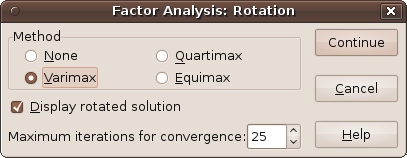
The nature of SPSS's proprietary licensing and the presence of digital restrictions management motivated the author to write an alternative which later became functionally identical, but with permission for everyone to copy, modify and share. PSPP is a statistical analysis tool developed to be a free, open-source alternative to SPSS (which is now developed by IBM).
#Pspp principal component analysis software
The PSPP project (originally called "Fiasco") was born at the end of the 1990s as a free software replacement for SPSS, which is a data management and analysis tool, at the time produced by SPSS Inc. Some of the libraries used by PSPP can be accessed programmatically PSPP-Perl provides an interface to the libraries used by PSPP. It can export files in the SPSS 'portable' and 'system' file formats and to ASCII files. This chapter lists parts of the PSPP language that are not yet implemented. PSPP can import Gnumeric and OpenDocument spreadsheets, Postgres databases, comma-separated values and ASCII files.

A range of statistical graphs can be produced, such as histograms, pie-charts, scree plots, and np-charts. Its aim is to reduce a larger set of variables into a smaller set of 'artificial' variables, called 'principal components', which account for most of the variance in the original variables. We also bumped up the Maximum Iterations of Convergence to 100. Under Extract, choose Fixed number of factors, and under Factor to extract enter 8. We also request the Unrotated factor solution and the Scree plot. SOFA supports the display results in an attractive format ready to share.This software provides a comprehensive set of capabilities including frequencies, cross-tabs comparison of means ( t-tests and one-way ANOVA), linear regression, logistic regression, reliability ( Cronbach's alpha, not failure or Weibull), and re-ordering data, non-parametric tests, factor analysis, cluster analysis, principal components analysis, chi-square analysis and more.Īt the user's choice, statistical output and graphics are available in ASCII, PDF, PostScript, SVG or HTML formats. Principal components analysis (PCA, for short) is a variable-reduction technique that shares many similarities to exploratory factor analysis. Under Extraction Method, pick Principal components and make sure to Analyze the Correlation matrix. SOFA is a user-friendly statistics, analysis, & reporting program, with an emphasis on ease of use, learn as you go, and beautiful output. Regress+ includes regression, stochastic modeling, bootstrapping and robust goodness of fit measures. The learning curve is fairly steep, but the availability of hundreds of add-on packages mean that almost anything can be accomplished.

R is probably the most sophisticated statistics software available. PSPP can perform several data transformation (including recoding, weighting and handling of missing values), compute descriptive statistics (frequencies, descriptive statistics), compute crosstabs and explore tables, T-tests (one sample T-test, independent samples T-test, paired samples T-test) and one-way ANOVA, bivariate correlationlinear regression, factor analysis (Principal Component Analysis and Principal Axis Factoring), Chronbach Alpha (reliability measure), ROC curve and some non-parametric tests (Chi-square and Binominal). PSPP is particularly aimed at statisticians, social scientists and students requiring fast convenient analysis of sampled data. It is similar to SPSS with a few exceptions. PSPP is a free program for statistical analysis of sampled data. Core MacAnova has a functional/command oriented interface, but an increasing number of capabilities are available through a menu/dialog/mouse type interface.
#Pspp principal component analysis series
MacAnova has many capabilities but its strengths are analysis of variance and related models, matrix algebra, time series analysis (time and frequency domain), and (to a lesser extent) uni- and multi-variate exploratory statistics. G*Power can also be used to compute effect sizes and to display graphically the results of power analyses.

G*Power is a tool to compute statistical power analyses for many different t tests, F tests, χ2 tests,z tests and some exact tests.


 0 kommentar(er)
0 kommentar(er)
